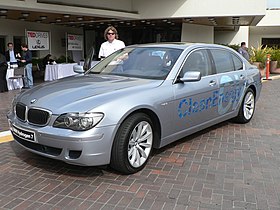- Joined
- Aug 8, 2008
- Messages
- 28,991
- Points
- 113
https://asia.nikkei.com/Business/Co...date=20200722090000&seq_num=10&si=%%user_id%%
Toshiba's megawatt fuel cells have enough juice to power a factory
Hydrogen system bolsters Japan's efforts toward renewables

Toshiba looks to expand the market for its hydrogen power systems.
TAKAYUKI YAO, Nikkei staff writerJuly 22, 2020 05:13 JST
TOKYO -- Toshiba is set to roll out a hydrogen-powered fuel cell system capable of generating enough electricity to power 1,000 homes, or an entire factory or hospital in a boost to a government push of the zero-emission energy source.
Toshiba Energy Systems & Solutions has developed a 1 megawatt system consisting of at least 10 of its existing 100kW hydrogen fuel cells and will start selling it as early as this fiscal year. A megawatt equals 1,000kW.
Other than Canada's Ballard Power Systems, there is no other supplier of hydrogen fuel cells with such capacity, according to the Toshiba subsidiary. Factories and hospitals generally require power capacity of 1MW to 2MW to operate.
Japan has been pushing hydrogen as a more environmentally friendly alternative to carbon-based fuels. Hydrogen can supplement solar and wind power supply, which tends to be unstable, generating electricity at night for those who rely on solar during the day, for instance. Another idea is to produce hydrogen using solar energy and generate power from that hydrogen later. Because hydrogen can be stored, it can be an emergency power source.
One issue is cost. Electricity produced by hydrogen fuel cells for industry users costs about 40 yen (37 cents) per kilowatt-hour by one estimate, roughly twice as expensive as conventional electricity. That figure is also higher than rechargeable batteries. Factories where hydrogen is created as a byproduct can use it as fuel.
Efforts are underway to build hydrogen fuel infrastructure in Japan. Trials have begun at a hydrogen production facility in Namie, Fukushima Prefecture, one of the world's biggest such plants. The project, which involves Toshiba Energy Systems and local utility Tohoku Electric Power among others, will produce and store up to 900 tons of hydrogen a year. Increased use of hydrogen could help bring down the cost of power generation.
With the shift away from coal and toward renewables, use of hydrogen is expected to grow. The hydrogen fuel market in Japan is set to undergo explosive growth from 7.3 billion yen in fiscal 2018 to 408.5 billion yen in fiscal 2030, according to projections by research company Fuji Keizai.
Toshiba's megawatt fuel cells have enough juice to power a factory
Hydrogen system bolsters Japan's efforts toward renewables

Toshiba looks to expand the market for its hydrogen power systems.
TAKAYUKI YAO, Nikkei staff writerJuly 22, 2020 05:13 JST
TOKYO -- Toshiba is set to roll out a hydrogen-powered fuel cell system capable of generating enough electricity to power 1,000 homes, or an entire factory or hospital in a boost to a government push of the zero-emission energy source.
Toshiba Energy Systems & Solutions has developed a 1 megawatt system consisting of at least 10 of its existing 100kW hydrogen fuel cells and will start selling it as early as this fiscal year. A megawatt equals 1,000kW.
Other than Canada's Ballard Power Systems, there is no other supplier of hydrogen fuel cells with such capacity, according to the Toshiba subsidiary. Factories and hospitals generally require power capacity of 1MW to 2MW to operate.
Japan has been pushing hydrogen as a more environmentally friendly alternative to carbon-based fuels. Hydrogen can supplement solar and wind power supply, which tends to be unstable, generating electricity at night for those who rely on solar during the day, for instance. Another idea is to produce hydrogen using solar energy and generate power from that hydrogen later. Because hydrogen can be stored, it can be an emergency power source.
One issue is cost. Electricity produced by hydrogen fuel cells for industry users costs about 40 yen (37 cents) per kilowatt-hour by one estimate, roughly twice as expensive as conventional electricity. That figure is also higher than rechargeable batteries. Factories where hydrogen is created as a byproduct can use it as fuel.
Efforts are underway to build hydrogen fuel infrastructure in Japan. Trials have begun at a hydrogen production facility in Namie, Fukushima Prefecture, one of the world's biggest such plants. The project, which involves Toshiba Energy Systems and local utility Tohoku Electric Power among others, will produce and store up to 900 tons of hydrogen a year. Increased use of hydrogen could help bring down the cost of power generation.
With the shift away from coal and toward renewables, use of hydrogen is expected to grow. The hydrogen fuel market in Japan is set to undergo explosive growth from 7.3 billion yen in fiscal 2018 to 408.5 billion yen in fiscal 2030, according to projections by research company Fuji Keizai.



